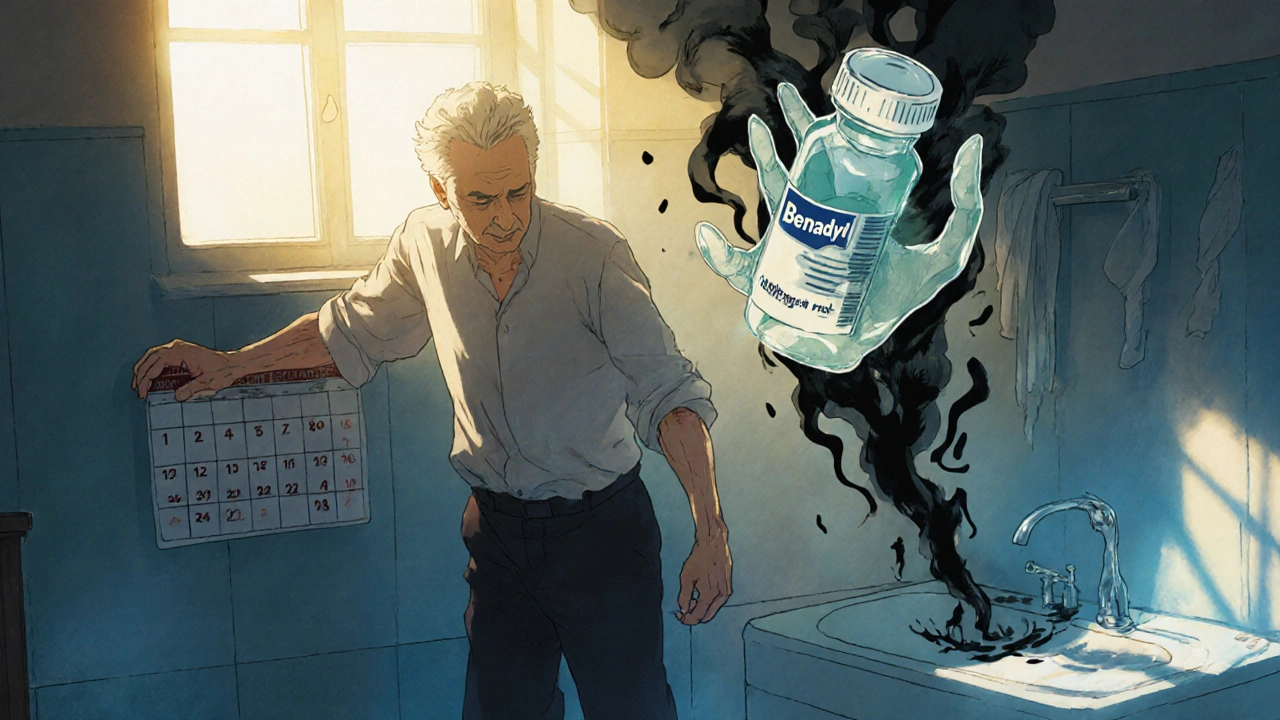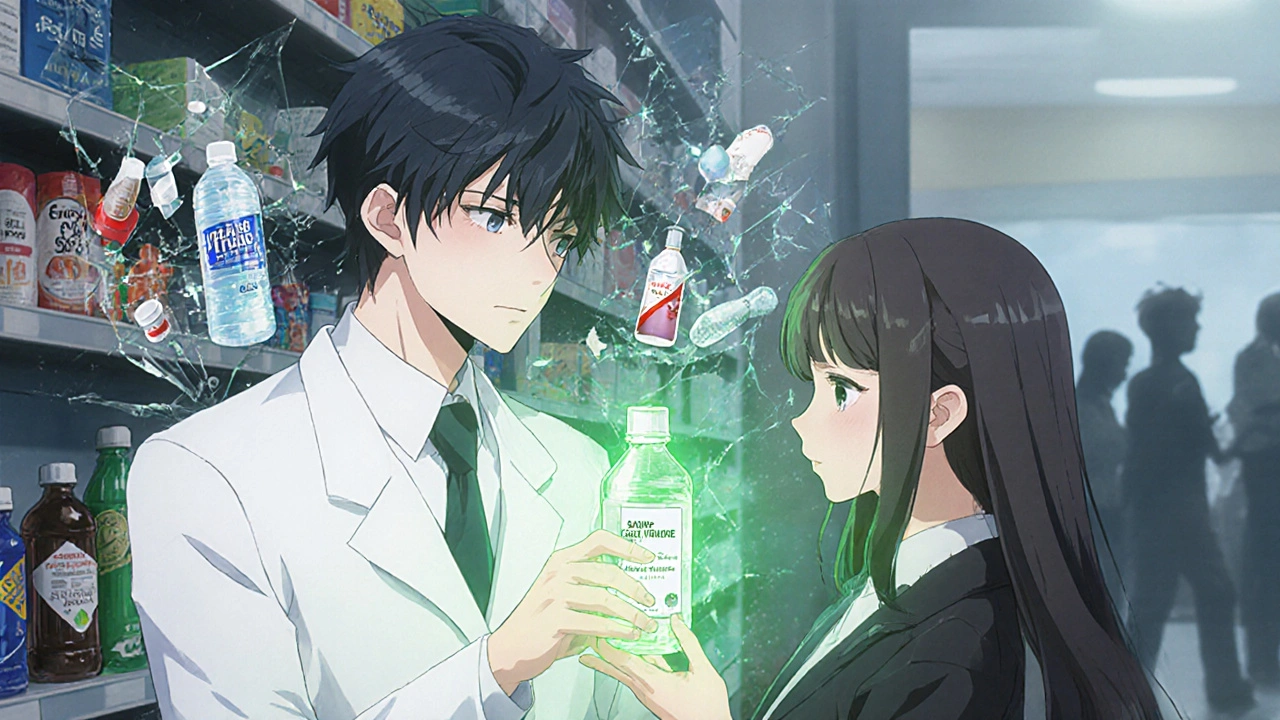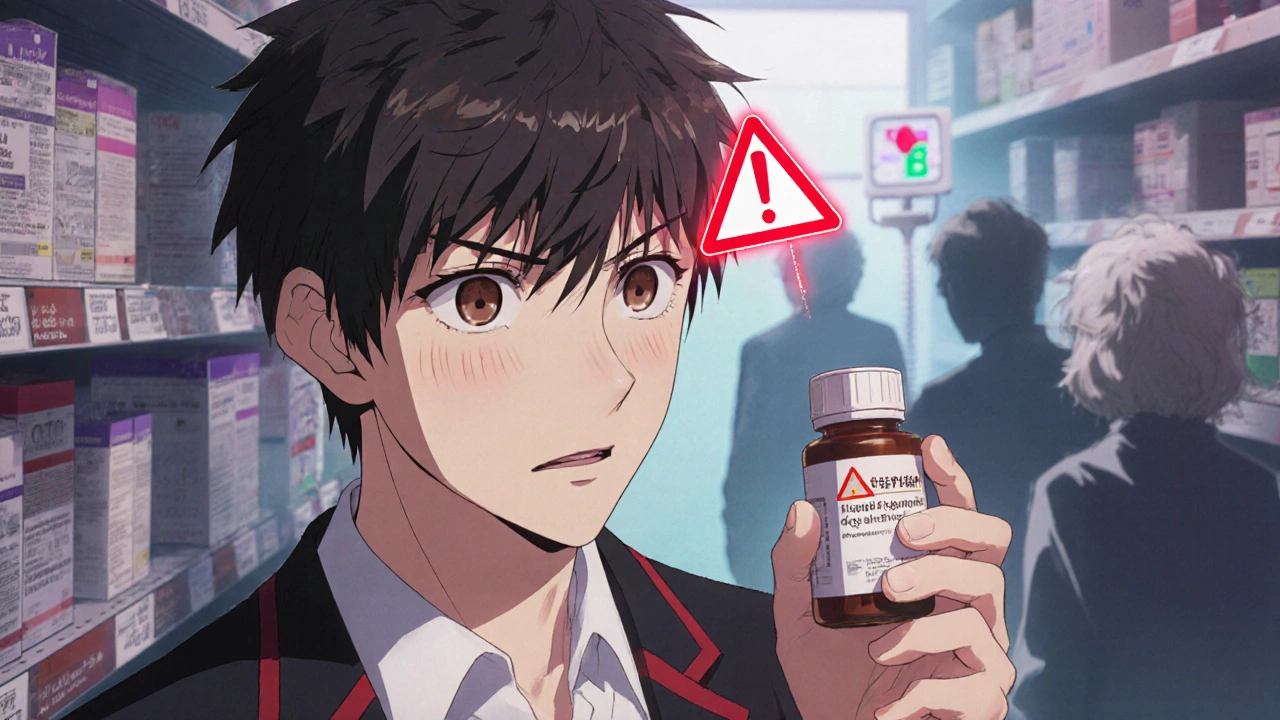Every year, millions of people reach for antihistamines and decongestants without a second thought. They’re on every pharmacy shelf, sold in bulk at supermarkets, and often handed out for free at doctor’s offices. But just because they’re easy to buy doesn’t mean they’re safe for everyone. These medications can cause serious problems - even death - if used carelessly. The truth is, most people have no idea what they’re really taking when they grab that bottle labeled "Allergy Relief" or "Sinus Congestion."
What Antihistamines Actually Do - And Why They Can Hurt You
Antihistamines block histamine, the chemical your body releases during an allergic reaction. That’s why they stop sneezing, itching, and runny noses. But they don’t just work in your nose. They also cross into your brain, especially the older ones like diphenhydramine (Benadryl) and doxylamine (Unisom). That’s why you get drowsy - sometimes so badly you can’t drive or operate machinery.
Studies show 50-60% of people taking first-generation antihistamines feel sleepy. That’s not a side effect you can just "get used to." It’s a safety risk. In people over 65, this drowsiness increases fall risk by 300%, according to AARP. One stumble can mean a broken hip, months in rehab, or worse.
But drowsiness isn’t the only danger. These drugs also dry out your mouth, eyes, and throat. That might seem harmless - until you realize it can make it harder to swallow, worsen dental decay, or trigger urinary retention in men with enlarged prostates. The NHS warns that antihistamines can even worsen angle-closure glaucoma, a condition that can lead to sudden blindness if not treated fast.
And here’s something few people know: stopping certain antihistamines suddenly can cause severe itching, sometimes worse than the original allergy. It’s called rebound pruritus. People think they’re allergic to soap or laundry detergent, when it’s actually the medication they stopped taking.
Decongestants: The Quick Fix That Can Break Your Heart
Decongestants like pseudoephedrine (Sudafed) and phenylephrine shrink swollen blood vessels in your nose. That’s why you breathe easier within minutes. But they don’t just shrink vessels in your nose. They tighten blood vessels everywhere - including in your heart and brain.
That’s why decongestants raise your blood pressure. On average, they bump systolic pressure up by 1-3 mmHg. Sounds small? For someone with existing hypertension - which affects 116 million American adults - that’s enough to trigger a stroke or heart attack. Mayo Clinic doctors say decongestants can spike blood pressure by 5-10 mmHg in vulnerable people. That’s not a warning label. That’s a red alert.
And it’s not just high blood pressure. Decongestants cause insomnia in 45% of users. Nervousness? 30%. Heart palpitations? 15%. Even hallucinations, though rare, have been reported. The NHS lists them as a possible side effect. And if you have diabetes, an overactive thyroid, heart disease, or kidney problems? The NHS says you shouldn’t take them at all without a doctor’s approval.
Then there’s the nasal spray version - oxymetazoline (Afrin). It works fast, but if you use it for more than three days, your nose gets worse. That’s called rebound congestion. You end up needing more spray just to breathe. Half of users who go past the three-day limit end up stuck in this cycle. It’s not addiction - it’s physiology. Your blood vessels stop responding to the drug and stay swollen.
Combination Products: The Hidden Overdose Trap
Most "all-in-one" cold and allergy meds contain multiple drugs. One pill might have an antihistamine, a decongestant, and acetaminophen (Tylenol). Sounds convenient? It’s a recipe for disaster.
People don’t realize they’re taking acetaminophen twice - once in the allergy pill and again in a pain reliever they take for a headache. The FDA says the maximum safe daily dose is 4,000 mg. But many combination products contain 650 mg per tablet. Take four of those, and you’re already at the limit. Add a regular Tylenol, and you’re over. Liver failure can follow in hours.
And it’s not just acetaminophen. Antihistamines in these combos can make urinary problems worse in men with enlarged prostates. Decongestants can trigger asthma flare-ups. And if you’re on antidepressants - especially MAOIs or SSRIs - combining them with decongestants can cause a hypertensive crisis. Blood pressure can shoot past 180 mmHg. That’s a medical emergency.
Energy drinks make it worse. Caffeine + pseudoephedrine = overstimulated heart. There’s been a 25% year-over-year rise in poison control calls related to this combo, especially among young adults.

Who Should Never Take These Medications
It’s not just about age or existing conditions. Some people shouldn’t touch these drugs at all.
- Children under 2: The FDA banned all cough and cold medicines with antihistamines or decongestants for this group after 123 cases of seizures, rapid heart rates, and deaths between 1969 and 2006.
- People over 65: First-generation antihistamines are listed in the Beers Criteria as potentially inappropriate. They increase confusion by 50% and fall risk by 300%.
- Men with enlarged prostates: Antihistamines can cause urinary retention - meaning you literally can’t pee. This is a hospital-worthy emergency.
- Pregnant women: The American College of Obstetricians and Gynecologists advises avoiding decongestants in the first trimester. Even antihistamines should be limited to second-generation types like loratadine, and only under a doctor’s care.
- People on antidepressants: MAOIs and SSRIs can interact dangerously with decongestants. Even stopping an MAOI two weeks ago isn’t safe yet.
What You Should Do Instead
There are safer ways to manage allergies and congestion.
For allergies, intranasal corticosteroids like fluticasone (Flonase) or mometasone (Nasonex) are far more effective than antihistamines for long-term control - and they don’t cause drowsiness or raise blood pressure. The Mayo Clinic says they’re just as good as decongestants for chronic congestion, without the risks.
For congestion, saline nasal rinses work better than sprays. They flush out allergens and mucus without any chemicals. Steam inhalation, humidifiers, and staying hydrated also help.
If symptoms last more than 10-14 days, it’s not allergies anymore. It could be a sinus infection, and antihistamines might make it worse by thickening mucus. Dr. Craig H. Zalvan says this happens in 25% of cases. You need a doctor, not a pharmacy aisle.

When to Talk to a Pharmacist - And Why It Matters
Pharmacists are the last line of defense before you take a risky pill. The American Pharmacists Association found that 78% of OTC medication problems could be prevented with a simple conversation.
Don’t just hand over your cash. Ask: "Does this interact with anything I’m taking?" "Is it safe for my blood pressure?" "Could this make my prostate worse?" Most pharmacists will check your history, even if you didn’t bring your list. Don’t be shy. Your life might depend on it.
And if you’re buying for someone else - a parent, a child, a friend - ask yourself: Do I know their full medical history? If the answer is no, don’t buy it. Wait. Call their doctor.
What’s Changing in 2025
The FDA updated labeling rules in September 2023. Now, all OTC allergy meds must clearly warn about cardiovascular risks. The European Medicines Agency already pulled phenylephrine off the shelves in 2022 because it doesn’t work well and carries too many risks.
More research is coming. Mayo Clinic is studying alternatives like nasal sprays with anticholinergic blockers that don’t cross the blood-brain barrier. The goal? Effective relief without the brain fog or heart strain.
But until then, the message is simple: Just because it’s sold over the counter doesn’t mean it’s safe. These drugs are powerful. They can save you - or hospitalize you. Know your body. Know your meds. And when in doubt, don’t guess. Ask a professional.
Are antihistamines safe for older adults?
First-generation antihistamines like diphenhydramine are not safe for most adults over 65. They increase the risk of confusion by 50%, falls by 300%, and urinary retention. The Beers Criteria, used by doctors nationwide, lists them as potentially inappropriate. Second-generation options like loratadine or cetirizine are safer but still require caution. Always check with a doctor or pharmacist before use.
Can decongestants cause a stroke?
Yes, in rare but serious cases. Decongestants raise blood pressure by tightening blood vessels. For someone with uncontrolled hypertension, this can trigger a stroke or heart attack. There are documented cases of systolic blood pressure spiking above 180 mmHg after taking pseudoephedrine, especially when combined with antidepressants or energy drinks. If you have high blood pressure, heart disease, or a history of stroke, avoid decongestants entirely.
Why do nasal decongestant sprays make congestion worse?
Nasal sprays like Afrin work by shrinking blood vessels in your nose. But if you use them longer than three days, your body gets used to them. The vessels stop responding and become chronically swollen - a condition called rebound congestion. You feel more blocked than before, so you use more spray. It’s a cycle that can last weeks or months. The only fix is to stop using the spray and let your nose heal - often with help from saline rinses or steroid sprays.
Is it safe to take antihistamines with alcohol?
No. Alcohol makes antihistamines even more sedating. The combination can cause extreme drowsiness, slowed breathing, poor coordination, and a much higher risk of falls - especially in older adults. AARP reports a 50% increase in fall risk when these two are mixed. It’s not just about feeling sleepy. It’s about losing control of your body. Avoid alcohol completely while taking any antihistamine.
What’s the safest allergy medication for daily use?
For daily allergy control, intranasal corticosteroids like fluticasone (Flonase) or mometasone (Nasonex) are the safest and most effective. They reduce inflammation in the nose without causing drowsiness or raising blood pressure. Second-generation oral antihistamines like loratadine (Claritin) or fexofenadine (Allegra) are also safe for daily use. Avoid first-generation antihistamines and decongestants for long-term use. Always confirm with your doctor if you have other health conditions.
Can I give my child an OTC allergy medicine?
Never give any OTC cold or allergy medicine to a child under 2. The FDA warns these can cause seizures, rapid heart rate, and death. For children 2-6, only use products labeled specifically for that age group, and only under a doctor’s advice. For older kids, second-generation antihistamines like loratadine are safer than older ones like Benadryl. But always check with a pediatrician - symptoms like congestion or sneezing often don’t need medication at all.
How do I know if my symptoms are allergies or something worse?
Allergy symptoms usually last a few days to two weeks and include sneezing, itchy eyes, and clear nasal discharge. If symptoms last longer than 10-14 days, or if you have thick yellow/green mucus, fever, facial pain, or worsening headaches, it’s likely a sinus infection - not allergies. Antihistamines can make infections worse by thickening mucus. See a doctor if symptoms don’t improve or get worse after two weeks.
These medications are not harmless. They’re powerful chemicals with real, documented dangers. Millions use them every day without thinking - and that’s exactly why so many end up in emergency rooms. The next time you reach for that bottle, pause. Ask yourself: Do I really need this? Do I know what’s in it? Could it hurt me? When in doubt, talk to someone who knows - a pharmacist, a doctor, a nurse. Your body isn’t a lab experiment. Treat it like the fragile, complex system it is.
